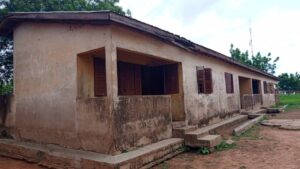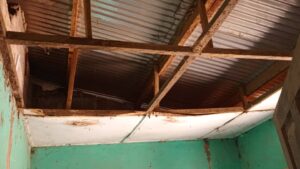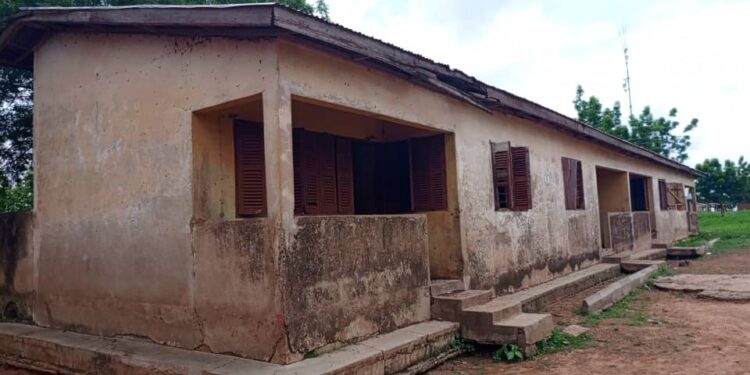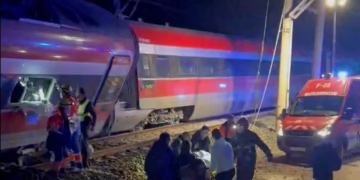SABOBA, Sept 13 (The African Portal) – A worsening teacher accommodation crisis in Saboba in the Northern Region of Ghana is fuelling attrition and undermining education delivery. Dilapidated quarters, poor living conditions, and the absence of basic amenities push teachers away from the district, leaving classrooms understaffed and children’s future at risk.
Beyond housing, Saboba schools face acute shortages of teaching staff, inadequate classroom blocks, and a lack of furniture. Teachers who cross the Oti River to reach their schools do so without life jackets, risking their lives in the line of duty.


The crisis reflects a nationwide shortfall of teacher accommodation, particularly in rural and underserved areas, threatening the quality of education delivery. In the Northern Region of Ghana, where the situation is dire, schools face high attrition, absenteeism, and declining academic performance.
A 2023 Ghana Statistical Service (GSS) and UNICEF report found that more than 60 percent of basic schools in northern Ghana lack adequate housing for teachers. In districts like Saboba, where roads are poor and infrastructure underdeveloped, the challenge discourages teachers from accepting or remaining at rural postings.
Ghana Education Service (GES) data also show absenteeism in some districts of northern Ghana, with the figure hovering around 30 percent, largely driven by a lack of housing and transportation. In Saboba alone, more than 45 percent of teachers reportedly leave within a short period of posting, citing poor housing, bad roads, unreliable electricity, weak mobile coverage, and other harsh conditions.
Checks by The African Portal indicate that attrition remains high in 2025, with 44 teachers applying for transfers out of Saboba compared to only 10 seeking transfers into the district.
Sanguli’s Dilapidated Quarters
The problem is stark in Sanguli, a farming community. An eight-room teachers’ quarters built in 2003 for the R/C Primary School has become uninhabitable, with collapsed ceilings, cracked walls, and no sanitation or electricity. The structure is now overrun by rodents and reptiles, and even doubles as an open latrine for some residents.


“With conditions like these, no teacher wants to stay,” said Philip Ofori Gyabaa, Assistant Headteacher. “The building may look okay from the outside, but inside—it’s a complete disaster.”
With only four permanent teachers managing kindergarten to Basic 6, some commute daily from Saboba town, cutting down contact hours for pupils.
Felglo Foundation Steps In
In response to the dire situation, the Felglo Foundation — the philanthropic arm of Felglo Enterprise — has launched an initiative to renovate the Sanguli quarters as part of its corporate social responsibility.
Partnering with Mr. Bukari John Nilimor, the company is restoring the abandoned facility to make it habitable again.
“Education is too important to leave to government alone,” Mr. Nilimor told The African Portal. “If teachers have no decent place to stay, how can they deliver quality education?”
The renovation includes structural works, roofing, sanitation facilities, electrical wiring, and solar-powered lighting. Pipework is currently underway, marking the first tangible progress in years.

“This is the first real sign of hope,” Mr. Ofori said. “We are grateful to Felglo Foundation and Mr. Nilimor for showing commitment where others have delayed.”
For pupils, the project is more than just infrastructure. “If our teachers have a place to stay, they will teach us well,” said Dalafu Nathaniel, Senior Prefect of Sanguli R/C Primary.
Government Response
Saboba District Chief Executive, George Wumbei, admitted the Assembly is worried about attrition. He, however, said plans are underway to assess all existing teacher quarters to identify facilities for renovation.
He also appealed to NGOs and corporate bodies to partner with government in addressing the crisis while urging teachers to remain committed to service despite challenges.
Education stakeholders, however, warn that without a comprehensive national policy on teacher housing in rural areas, interventions like Felglo’s may remain isolated rather than sustainable solutions.






